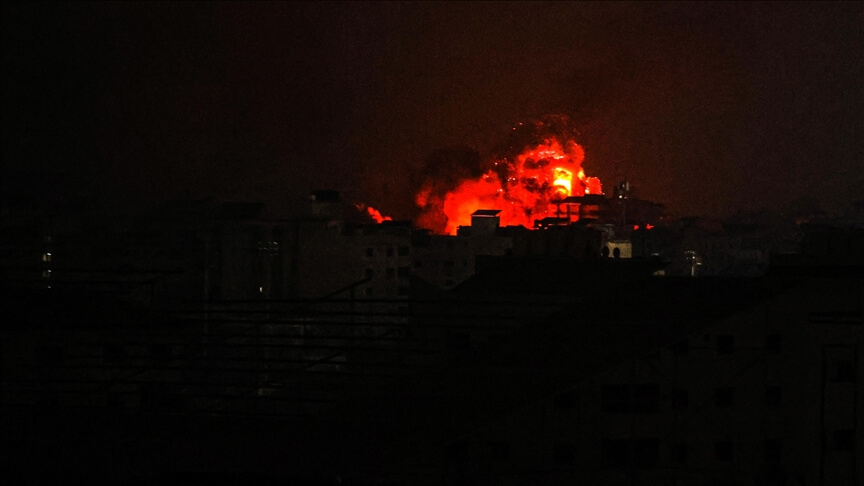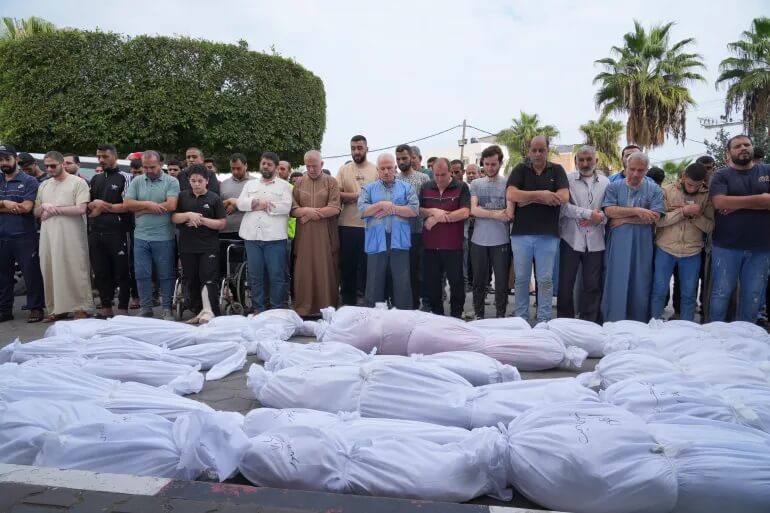After a series of Israeli bombardments, mobile phone services and the internet in Gaza have been cut off, says Jawwal, a Palestinian telecommunications company, in a Facebook post. The bombardment of Israeli forces has intensified, and without electricity and telecommunication, there’s a complete blackout in Gaza.
The assault of the Israeli army continues as Gaza plunges into darkness. Without food, water, or any safe shelter, the future of thousands of Palestinians is now uncertain.
A few reports that came out of the enclave on Saturday showed confusion and suffering as families searched for information about relatives, paramedic teams, and charity organizations tried to coordinate rescue and relief efforts.
BBC journalist’s statements
Since communications were cut off on Friday night (October 27th), ambulance drivers were unable to receive directions and chose to go in the direction of explosions, according to Rushdi Abualouf, a journalist for the BBC in Gaza.
“Everywhere there is panic, even in this less bombed area of Khan Younis, people are trying to contact relatives in other areas to make sure they are safe, but the phones are down,” he wrote. “Total chaos reigns.”
Jawwal, a Palestinian telecom company, claims that the attack has destroyed “all remaining international routes connecting Gaza to the outside world.” The bombardment, according to telecom company Paltel, resulted in “complete disruption” of landline, cellphone, and internet services.
Senior Israeli government adviser Mark Regev said that blocking enemy communications is a common approach during hostilities, but he did not state that it was done on purpose. “Disturbing the enemy’s communications is frequently standard procedure in military operations carried out by the American and British armies.”
Complete blackout in Gaza and IDF’s increased efforts
Reporters, civil society organizations, relief organizations, and Palestinians all claimed to have lost contact with their families and employees in Gaza. A very strong bombardment was reported in the area shortly after reports of lost service, and the Israel Defense Forces said that their air and ground forces were stepping up their attacks in Gaza.
With the majority of electricity turned off and generator fuel running out, Gaza’s 2.3 million residents were left in complete darkness and cut off from the outside world.

Hours of nonstop bombings over Gaza City produced explosions that lit up the sky, but the communications outage made it impossible to instantly determine how many people were killed in the strikes or how specific the ground invasions were.
Relatives of Palestinians living outside of Gaza have not been able to get through. Mohammed el-Kurd is a poet and author who tweeted, “No one I know in Gaza is answering my texts.”
Hospitals shutting down completely
The hospitals in Gaza were already short on supplies, and there have been warnings from Israeli officials for evacuation. The bombing of the Baptist hospital was an open war crime, for which the IDF blames the Islamic Jihad militant group. There have been many debates on who bombed the hospital, but Israeli forces have bombed Palestinian hospitals in the past.
Due to the lack of medical supplies, electricity, fuel, and communication, the hospitals in Gaza are now shutting down. Amidst the blackout in Gaza, Israeli forces have increased their bombardments.
UN humanitarian coordinator for Palestine, Lynn Hastings, tweeted that hospitals and relief operations could not function without internet and phone connections. “Rules govern wars. Civilians need to be safeguarded, she declared.
Human rights organizations and relief agencies such as Unicef, ICRC, Médecins Sans Frontières, and Amnesty International reported that they had lost all communication with their employees in the conflict-ridden region.

Lynn Hastings, the UN humanitarian coordinator for Palestine, stated that phone and internet connections are essential for hospitals and relief efforts to run smoothly. War is governed by rules. She proclaimed that civilians ought to be protected.
Human rights groups and aid agencies, including Amnesty International, Unicef, Médecins Sans Frontières, and the ICRC, reported that they had lost all contact with their staff members in the area riven by fighting.
In a statement, Tedros Adhanom Ghebreyesus, the director-general of the World Health Organization (WHO), said: “We have lost touch with our staff in Gaza, with health facilities, health workers and the rest of our humanitarian partners on the ground. This siege makes me gravely concerned for their safety and the immediate health risks of vulnerable patients.”